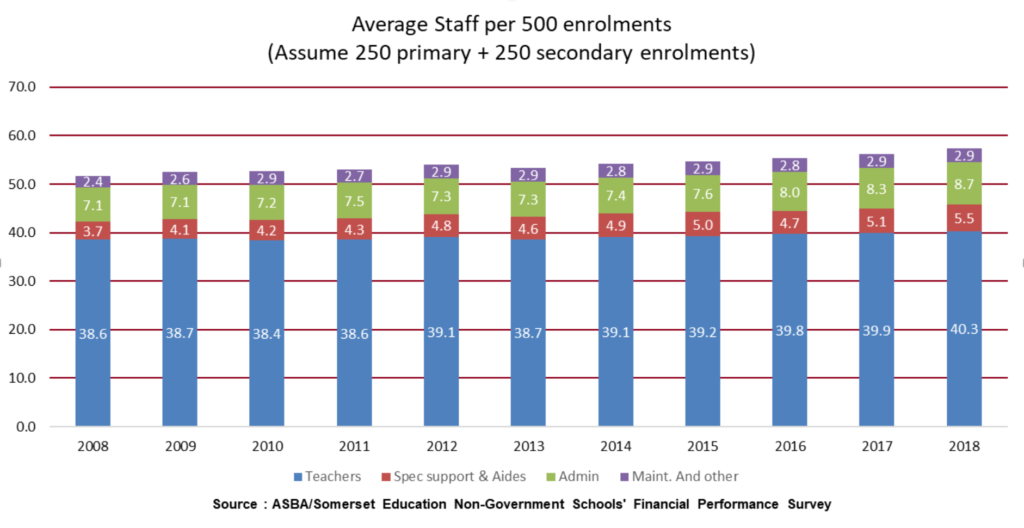
Figure 1 indicates over the 10 years from 2008 to 2018 the average number of staff in an Australian Independent School of 500 enrolments increased by 5.7 FTE (+11%) representing about $630,000 per annum in additional wages. This contributed to a 50% increase in total operating costs over the same period.

Figure 1 Average number of full time equivalent (FTE) staff in an Australian independent school of 500 enrolments
My previous blogs included, Is Your School Recession Ready? (October 2019), Accounting for Your Customers including using the ASBA/Somerset Non-Government Schools Financial Performance Survey (FPS) to “Identify and quantify financial strengths and weaknesses” (February 2020), Using Data to Drive Your Decisions (April 2020) and A Financial Crystal Ball – Key to School Sustainability (June 2020).
My blog dated 26 March 2020 referred to the Covid-19 pandemic as presenting an opportunity for change, being grateful for the continued need for education services but acknowledging challenges including reference to the growth in staff and costs as presented in Figure 1. I also called for schools to consider how processes could be re-engineered to improve efficiencies going forward. So, today’s blog offers some practical suggestions.
The ability to adapt to changing circumstances is an important attribute of financially sustainable independent schools. The FPS, a tool which facilitates benchmarking of revenue, expenses, surplus, staffing, debt, working capital and asset reinvestment with similar schools, is a crucial tool to help identify strategies for improving efficiency.
I implore schools to pro-actively consider how they can adapt to what is likely to be difficult economic and financial times ahead, like Chameleons that are infamous for adapting to changing environments!
How did Dutch local Authorities adapt to financial crisis?
(Steccolini, Saliterer, Singh Jones, & Berman, 2017)
I know what you are thinking, “he’s gone mad, what do Dutch local authorities have to do with Australian Independent schools?”. Well the similarities are striking, and innovative schools engage in “out of the box” thinking. So, bear with me for the discussion.
Similar to schools, public sector organisations have a primary objective to meet service delivery and financial commitments now and into the future without debt rising continuously. Sustainability requires maintenance of service quality and volume while producing operating surpluses sufficient to repay debt and replace/improve assets.
Summarised below is one country’s deficit-reducing responses to adapt to a financial crisis.
Dutch local authorities are structured like Independent schools with a governing Council, Chair, and an Executive to run the organisation and inform the Council on policy and budgetary issues. They receive most of their funds from central government (like federal and state grants in independent schools) and charge for services plus local taxes (like fees in independent schools). Asset reinvestment is funded from operations and reserves.
Since 2010 Dutch City Councils have been coping with serious levels of financial stress due to a decline in central government funding and reduced fees and taxes from an economic downturn and with limited ability to diversify their income. Moreover, the vulnerability was increased by a high level of debt. Respondents to this Dutch study referred to this event as being the largest financial challenge in their careers due to the severity and suddenness of the crisis.
I could not help but draw parallels with the Covid-19 pandemic and its likely adverse effect on the Australian economy and Independent school enrolments resulting in probable reduced income and financial stress.
In spite of the serious issues and consequences from their crisis, Dutch local authorities used it as an opportunity to improve transparency, introduce organisational innovations, reduce organisational slack, and stimulate team spirit and pride. So, what did they do?
Responses included:
- Acting immediately once consequences of the crisis were identified
- Using reserves to restore the fiscal gap
- Participating annually in benchmarking and stress testing programs to generate insights
- Initiating organisational reforms and optimizing work processes including
- introducing shared services to improve efficiencies
- redesigning jobs
- merging units
- introducing online services
- reducing staff and costs – across the board and targeted
- Ending some services
- Evaluating capital expenditure to continue, postpone or cancel projects
- Preparing multi-year forecasts and budgets
- Optimising procedures and risk analysis of new policies and projects
- Calculating precise financial consequences of new proposals to advise council/executive
- Introducing professional risk management systems including a risk officer
- Developing early warning systems
- Improving the control, monitoring and transparency of finances
- Improving capacity of financial managers and executive
- Developing partnerships e.g. tapping additional income sources such as co-sponsoring investments
- Changing relationships between community and the Council.
As well as the above measures to restore fiscal deficits, long-term responses included realigning actual operational outputs with strategically desired outputs. Another interesting observation was a realisation that they operated in a broader web of stakeholders “Having a deficit is not a problem of the municipality, it’s a societal problem. The society therefore needs to be involved from the beginning, to solving it.”
Somerset Education offers tools to help facilitate many of the actions listed above including the annual FPS, Budgeting and Reporting and Training.
We are in unprecedented times and I encourage schools to act now to consider strategies to navigate the current and looming financial crisis. I hope this brief summary provides useful insight into what others have done to restore fiscal balance when faced with similar circumstances.
Kindest regards

John Somerset is a Chartered Accountant. He has extensive knowledge of the independent school sector and is past President of Independent Schools Queensland and a past board member of the Independent Schools Council of Australia.
UPCOMING EVENTS:
SEA School Financial Governance—Webinar, 26 August 2020.
ISNZ School Financial Governance—Webinar, 27 August 2020.
ACS School Financial Governance—Webinar, 10 September 2020.
AISSA School Financial Governance—Webinars, 15 and 21 September 2020.
Reference:
Steccolini, I., Saliterer, I., Singh Jones, M. D., & Berman, E. (2017). Governmental Financial Resilience : InternationalPerspectives on How Local Governments Face Austerity. Bingley, UNITED KINGDOM: Emerald Publishing Limited.
